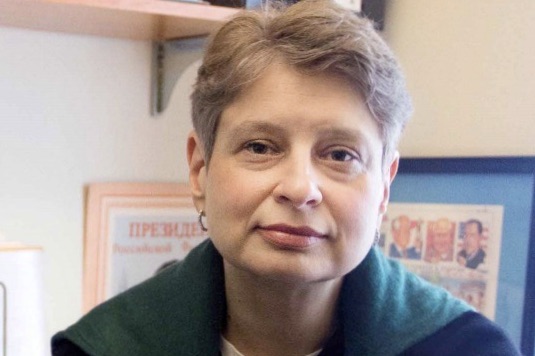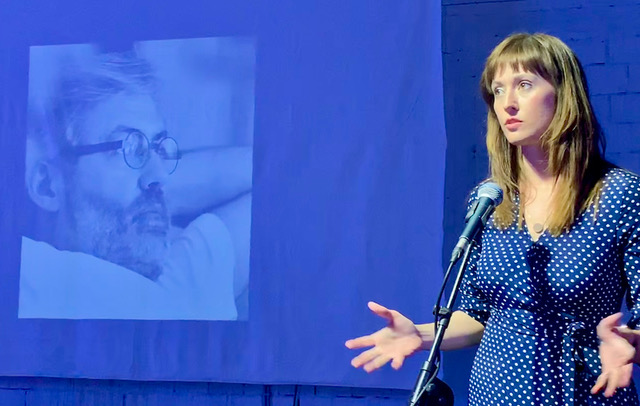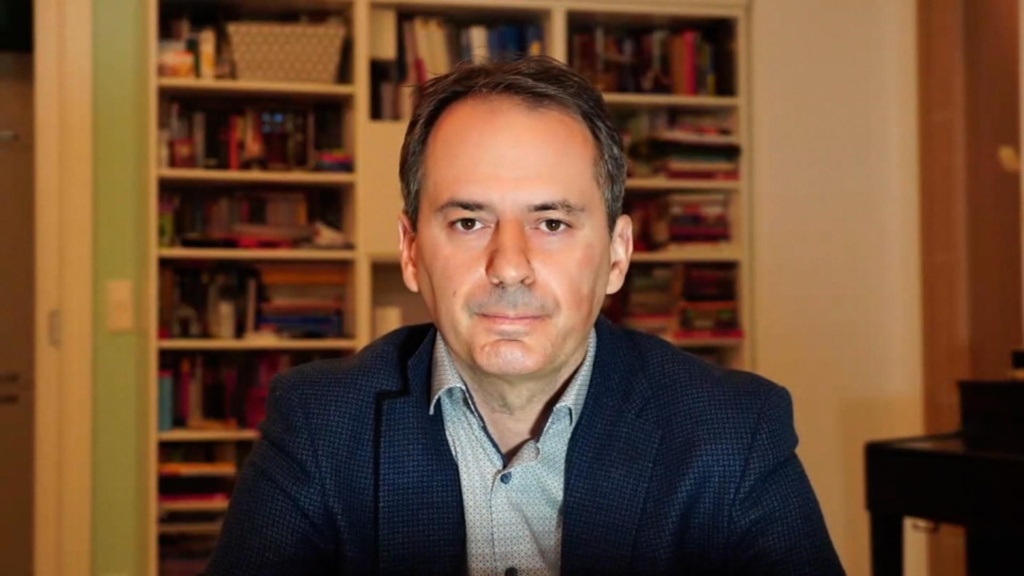
Nina L. Hruščova (foto: privatna arhiva)
Nina L. Khrushcheva is a professor at the New School’s Department of International Relations in New York, where she teaches international politics, focusing on the study of propaganda and the media and she is a senior associate at the World Policy Institute in New York.
After graduating from Moscow State University, Khrushcheva received her doctorate from Princeton University in the United States. Her grandfather is Leonid Khrushchev, the eldest son of the former first secretary of the Communist Party of the Soviet Union and Prime Minister Nikita Khrushchev, who led the USSR for ten years after the death of Joseph Visarionovich Stalin (1953-1964). After Leonid died as a pilot in World War II, Nikita adopted his two-year-old daughter Julia, Nina’s mother. Julia grew up as Nikita’s daughter, and Nina as his granddaughter.
In addition to her work at the university, Nina Khrushcheva is well known in the United States for her public appearances in which she comments on Russian and American politics, often from a media perspective.
Cenzolovka: You used to teach one of the most original graduate classes at the New School. It was delightful not only to learn about the origins of propaganda but to write speeches and to embody world dictators. This was over 10 years ago, and I remember discussions about propaganda vs. political spin. How do you see propaganda being used these days?
Nina Khrushcheva: What I have discovered in trying to teach propaganda in recent years is that it has become too concrete. There is a thesis and there is an antithesis in propaganda. You can make up a story, and then others can dispute it.
There is no longer an option to dispute. Everyone lives in their own bubble engaged with their own „truth.“ So propaganda becomes not just a political tool but a part of a constructed reality, a reality beyond just slogans, speeches, posters, parades and so on. Today, what’s a one man’s propaganda is another man’s truth, so to speak.
Cenzolovka: You recently told me that you are not even sure that propaganda matters anymore, since it looks like that opinions have replaced facts. Can you tell us more about it?
Khrushcheva: Opinions, attitudes, feelings–they are all now „facts“ that people choose to believe and follow. I am lucky not to teach journalism; I wouldn’t know how anymore. If we look at today’s journalism, it is not only a construction of a story which it used to be. It is now construction of a narrative, of a certain perception of reality. Well, more than just a perception of a certain reality that is created in the media, and people live in it rather than in their actual factual life.
If it is not fact-based, it is not journalism
Cenzolovka: While I was your student, journalism largely meant reporting about factual events. Nowadays, we speak about „facts-based journalism“ and about the news that are „fake“. Did your perception of media change?
Khrushcheva: Journalism is facts-based, there is no other kind. So if we have to speak about it and define it, it means we no longer have it.
When I say that facts are now feelings, that’s exactly what I mean. Even for journalists, facts today are interpreted according to the desired narratives. Generally, we can call it propaganda, but it is more than just propaganda; it is an overall climate, an environment that those „fake news“ create.
Fake news is an oxymoron, of course, as news, if they are news, cannot be fake. If they are fake, they are lies or gossip, not news.
Cenzolovka: Can we speak about „media wars“ nowadays? The U.S. media regularly reports about the „army of Russian bots“ that are actively targeting social media users with „the aim of weakening the U.S. democracy.“
Khrushcheva: And then the United States undermines Russian statehood by maligning the Kremlin, Russia and everything it does every day.
How is it ok to call Putin Hitler? So what is the difference? Why is it ok for the U.S. and not ok for the Russians to respond?
I am not defending Russia, but I am not absolving the U.S. of hubris and hypocrisy and its own shady methods–self-righteous misinformation, trade wars disguised as fights for democracy, etc.
Its notion of manifest destiny, a shining city upon the hill and so on, allows it to think of its messianic innocence see- Edward Said’s Orientalism. The U.S. sees itself as the carrier of „weapons of mass love“ vs. everyone else’s weapons of mass destruction, in Dick Cheney’s definition.
So it can do whatever it wants. Putin doesn’t buy this, and frankly, neither do I.
The U.S. is equally capable of disseminating fake news, and does it–however, it does it more with spin and conjecture than perhaps full misinformation, but they certainly use that device as well. It has a global communication apparatus and offers of „soft power“ on its side.
Of course, why won’t they–they are the best in the invention of media and consumption tools of self-gratification. So it has advantages, but fewer people now, because of those U.S. invented tools, buy the American innocence and their good will propaganda.
Russia loses, and rightly so, but the U.S. is not a do-gooder angel as it shouts via global megaphones.
As for their undermining democracy argument–they undermine regimes everywhere every day. These are bad regimes, certainly, but if the U.S. democracy is so wonderful, how is it so easily undermined?
And yet because of the manifest destiny myth the U.S. thinks it is all appropriate to blame others for its faults. How could it possibly be guilty, that shining city upon the hill? Everything is always someone else’s fault. They have no humility or sense of humor, and that will ultimately be their destruction.
Russia only uses American techniques
Cenzolovka: The State Department recently published 70 pages long study unmasking shadowy websites that have originated in Russia. They are conceived to look like mainstream media and are, in fact, disseminating fake news.
Khrushcheva: I wouldn’t immediately trust the State Department and its publications. Not that there are no shadowy websites linked to Russia, I am sure they are or can be.
But as the State Department used and manipulated information when they were charging towards the war on terror, the same is the case of Russia.
What is more interesting is that we were ready to doubt, and doubted their information when it is concerned, say, islamophobia. But with Russophobia, suddenly we never doubt the U.S. source, and follow anti-Russian hysteria as proven facts without thinking of who is interested in it. For example, when Biden numbers go down now, they immediately shriek about Russia.
I think the difference is that in Russia, no one expects those „news“ to be news, people here understand the „propaganda“ nature of those–they indiscriminately thrash us, we equally indiscriminately, and also very creatively using their own techniques, thrash them.
In the U.S., it is their „right“ to malign anyone who is not them, and how dare the Russians respond to our self-righteous lecturing.
Once again, Russia doesn’t create divisions and hate in the U.S., it uses American own models and sites to amplify. I am not an apologist for Putin or Russia, I am saddened that the US Hollywood culture of non-reality finally caught up with itself, and it is as always unwilling to take responsibility and looking for scapegoats.
Putin, with his foreign operative background, wouldn’t be Putin if he weren’t to take advantage of this. The U.S. has taken advantage of such national tremors all over the world.
Cenzolovka: In your recent article, you write: „In devising my escape, I had to do what every Russian does—go around what’s permitted. Russia is big in size, but it has never been big on nuance… The state has an unquenchable need to control and the people need to break the rules. We never believe that things work out, so we try to outsmart the system rather than wait for a problem to be resolved. „
This has very much reminded me of Serbia. It also made me think about ways people in former communist countries write and read the news – by reading between the lines. Do you see any differences in the way media is consumed, and news understood in the West as opposed to Russia?
Khrushcheva: We talked about it in propaganda class 15 years ago, I think. I began to teach the course after the U.S. invaded Iraq under false pretenses because I discovered that Americans are gullible, have no sense of humor, no humility and have no idea how to read between the lines.
Now it is so much worse with the twitter generation. They only read their twitter feeds or instagram posts, which of course have no context or depth. I am not sure there is a difference any more between countries and consumption.
We now all live in an American soundbite world. The U.S. gave us tools to become Americans (the greatest achievement of propaganda BTW, the true victory in the cold war–being airheaded means to be free), and we swallowed it whole–their consumer comfort and rampant individualism.
So now we complain that being a shallow idiot (Donald Trump is not an exception, he is the rule–the perfect son of the country) is not as perfect as we thought it would be in 1989.
Today, America should be proud of its achievement to make everyone live in the American world, the problem of course that even America now doesn’t want to be this America any more.



 Ubistvo u Ulici Slavka Ćuruvije
Ubistvo u Ulici Slavka Ćuruvije Grozev: Vrednost FSB izveštaja o zvučnom oružju je nula, duboko je uvredljiv za svakog ko kritički razmišlja
Grozev: Vrednost FSB izveštaja o zvučnom oružju je nula, duboko je uvredljiv za svakog ko kritički razmišlja Izveštavanje o Srebrenici jula '95: Nevladini mediji nisu znali da li da veruju, režimski slavili zločince
Izveštavanje o Srebrenici jula '95: Nevladini mediji nisu znali da li da veruju, režimski slavili zločince
Ostavljanje komentara je privremeno obustavljeno iz tehničkih razloga. Hvala na razumevanju.